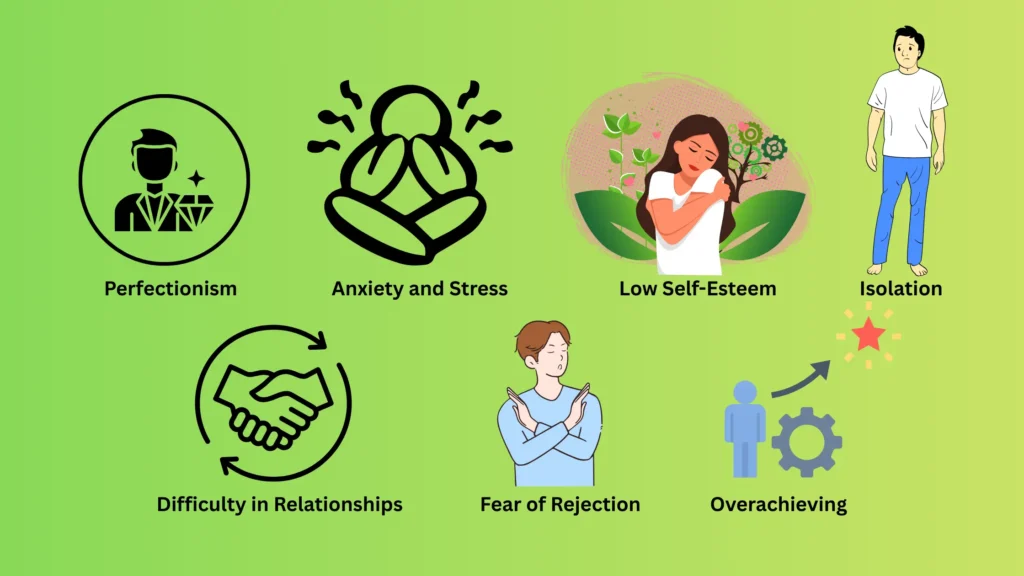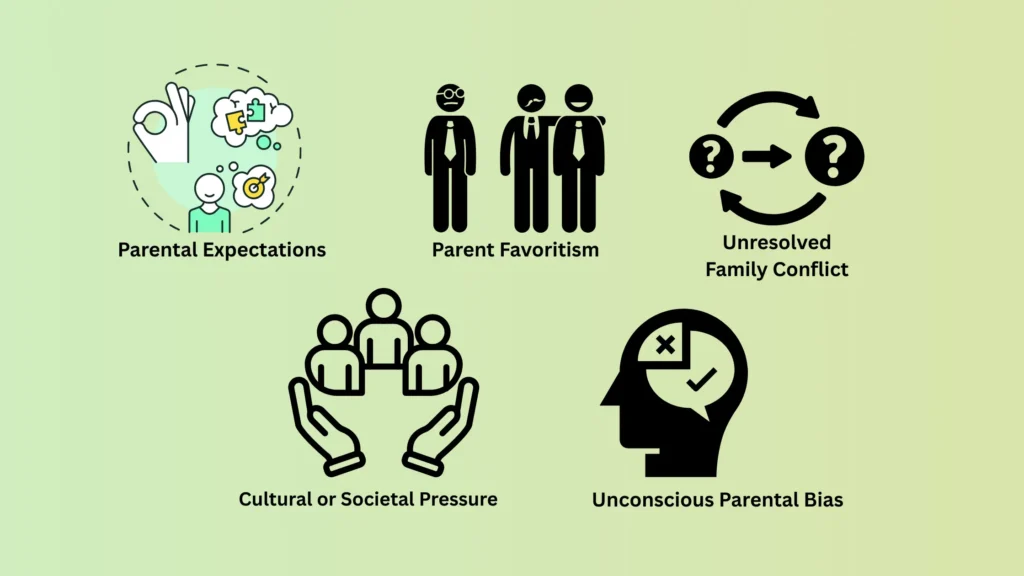“Golden Child Syndrome” is a phenomenon that happens when one child in a family is considered the “favorite” or “golden child” and is often subjected to excessive expectations, pressure, and attention. This phrase is more than simply a designation; it refers to a complicated web of relationships that may affect a child’s psychological growth and emotional well-being for a long time. We shall examine Golden Child Syndrome’s symptoms, underlying causes, and long-term implications in this pillar material.
What is Golden Child Syndrome?
At its core, Golden Child Syndrome refers to the emotional and psychological imbalance caused when a child is overly idealized and held to high expectations by their parents or guardians. This child is usually painted as ideal in the eyes of the family, and any effort is made to stress his/her glory, much to the disregard of failures or diminutions. The result of such treatment may create dysfunctional families such that children lack self-worth, are lonely and in effect, emotionally neglected by the rest of the family. Favored by special privileges, including more attention, resources or possibilities, the golden child is frequently even more privileged. This type of treatment is, however, not associated with support or understanding that can enable the child to process the demands given to them.
Golden Child Syndrome Symptoms

The symptoms of Golden Child Syndrome can vary, but they often include a range of emotional, psychological, and behavioral signs. The child may be under extreme pressure to perform at a high level, which makes him feel anxious and unconditionally perfect. Among some common symptoms is the fact that:
Perfectionism
Golden children will be perfectionists who have very high standards set up due to the fear of failure to please the parents. This uncompromising desire to be perfect may make them overwork themselves and break to achieve a perfect state and this may make them be stressed to the point where they wear out.
Anxiety and Stress
Constantly trying to meet the ever-increasing expectations can lead to high levels of stress and anxiety. This pressure can create a sense of unease, causing the child to feel overwhelmed and trapped in a cycle of constant performance, often leading to panic attacks or sleepless nights.
Low Self-Esteem
The golden child may have low self-esteem, although everyone seems to praise his or her achievements. The desire to be perfect all the time may lead to the child developing the conviction that he or she is only appreciated for what he or she can do, and end up feeling insecure and lacking confidence in their core worth.
Isolation
The golden child may feel isolated from other children or other relatives who are jealous that they are favored all the time and not disciplined the same way. This alienation may lead to the development of a feeling of loneliness in the golden child, as he/she can no longer connect well with others who are not around this kind of pressure.
Difficulty in Relationships
Because of the idealization they face at home, the golden child may struggle to form authentic connections with others. They may feel misunderstood or unable to live up to the expectations placed on them by others. The pressure to maintain perfection in relationships can also lead to difficulty being vulnerable or expressing true emotions.
Overachieving
The desire to surpass expectations may also transform into an unhealthy OCD of overachieving, that on the long run may lead to burnout. The golden child can over challenge themselves to do so much, that they forget about their mental well-being, consistently trying to reach the impossibilities.
Fear of Rejection
The golden child may feel the deepest fear of failure and rejection, where so much is made a big deal of their successes. This is because fear can turn into an extreme desire to avoid making any mistakes whatsoever, resulting in a reluctance to attempt something new or take risks because they fear the implications of failing under the strict requirements set by their parents.
Golden Child Syndrome Causes

Numerous factors, including family dynamics and the psychological aspects of parent-child interactions, can contribute to the development of Golden Child Syndrome. Among the main reasons are:
Parental Expectations
Parents with Golden Child Syndrome frequently have irrational expectations for their children’s accomplishments, which puts a great deal of pressure on the child to meet these standards. The child may grow up feeling that nothing they accomplish is ever good enough as a result of this constant pressure to be flawless, which can lead to long-term stress and a lowered sense of self-worth.
Parent Favoritism
In certain families they favor or single out a child due to his talents, looks, or actions making the other children feel alienated. Such favoritism may attract a lot of resentment between the siblings who do feel unloved, undervalued, and loveless, hence resulting in rivalry and fighting within the family unit.
Unresolved Family Conflict
The golden child may become a symbol of stability or success in families with conflict or emotional instability, and parents may utilize it as a coping mechanism for their own problems. Unaware of their role, the youngster may be forced to maintain a faultless façade, absorbing the emotional turmoil of the family and frequently feeling stuck in their own achievement.
Cultural or Societal Pressure
Societal pressures, such as a focus on academic achievement or athletic success, can also play a role in creating Golden Child Syndrome. The child may face additional pressures from outside the home, where their accomplishments are judged by society’s standards, making them feel even more compelled to meet expectations that may not align with their own desires or abilities.
Unconscious Parental Bias
Parents may favor one child above the others without even realizing it. The imbalance may be maintained if they see the golden child as a reflection of their own identity or accomplishment. While the golden kid feels a tremendous need to satisfy the parents’ implicit goals and aspirations, other children frequently feel invisible or irrelevant due to this unconscious bias.
Long-Term Effects of Golden Child Syndrome
Golden Child Syndrome can have serious, long-lasting consequences that impact the entire family, not just the golden child. The following are a few potential long-term effects:
Emotional Baggage
The golden child may bring the burden of unrealistic expectations into their adult life, resulting in such problems as anxiety, depression, and burnout. The feelings that were never resolved may become deeply entrenched, thus making it hard to go on with day-to-day problems without feeling overwhelmed. The child can become distraught at feeling that they are never enough, despite outward signs of success, which in the long run can erode the self-worth of the child.
Difficulty with Failure
The golden kid may find it difficult to handle failure in adulthood since they were never taught how to handle setbacks, because they were brought up to be flawless. People who are unable to accept failure as a natural part of life may become afraid to take chances or venture outside of their comfort zone. As an adult, they may find themselves paralyzed by the thought of not meeting expectations, creating a barrier to personal growth and development.
Strained Family Relationships
One child may be treated as the golden child to come in, and that can trigger jealousy and resentment among siblings, resulting in long-term rifts in family relationships. Brotherly relations can be characterized by rivalry, bitterness, or even a lack of understanding, especially in cases when one of the children will always feel in the shadow or deprived of attention. This may carry on into adulthood, where the siblings have difficulty establishing trusting and healthy relationships because of years of friction.
Struggles with Identity
The golden child might have a hard time finding an identity that is not related to the successes he or she was accustomed to in childhood. This may render it difficult to find satisfaction in their lives of adulthood because their self-esteem was pegged on external gratification. The golden kid may grow up feeling lost or uncertain of who they are, as well as though their career and personal goals have vanished.
Burnout and Exhaustion
The constant pressure to maintain an image of perfection can result in physical and emotional exhaustion, leading the golden child to experience burnout in their professional and personal life. Deep exhaustion may result from this never-ending pursuit of exceeding expectations without ever really stopping to rest or recharge. Their mental health may eventually suffer as a result of this fatigue, making them feel disengaged from their objectives or unable to take pleasure in the fruits of their labor.
Golden Child Syndrome in Siblings
The other siblings in the family frequently cope with their own difficulties, while the golden kid is under a lot of pressure. In contrast to the golden kid, they could feel ignored, underappreciated, or overlooked, which can cause them to lack self-worth and have a tense connection with their siblings.
Children who are not considered golden may experience feelings of inadequacy and may resort to coping strategies such as rebellion, resentment, or seclusion. As the golden child is given more attention while others are left to deal with their emotions of neglect, tensions can rise within the family.
Table of Contents
How to Help a Golden Child Cope

There are a number of strategies to assist your child in managing the stresses they encounter if you suspect that they are suffering from Golden Child Syndrome. The following advice is for parents and other caregivers:
Encourage Open Communication
Promote Open Communication: Create an atmosphere where your child can freely express their emotions and anxieties. They can better understand their feelings and develop healthy coping strategies by processing the stress and worry they may be experiencing. Let them know that you are always willing to listen without passing judgment or interjecting.
Promote Healthy Boundaries
Stress that failure is a normal part of life and set reasonable goals for success. Encourage your youngster to realize that their worth comes from their character rather than their accomplishments. Instill in them the value of personal development over perfection, while promoting acceptance and self-compassion in the process.
Provide Equal Attention
Make sure every youngster feels equally appreciated and cherished. To foster an environment of justice and harmony, refrain from showing preference and make sure to acknowledge each child’s accomplishments and strengths. Spending time getting to know each child on an individual basis and praising their special traits and contributions will strengthen your relationship.
Seek Professional Help
Consulting a therapist or counsellor can be a beneficial first step in processing and healing if the psychological and emotional repercussions of Golden Child Syndrome are giving you a great deal of distress. In addition to providing strategies to enhance family relationships and emotional stability, a professional can help the youngster manage anxiety, self-worth concerns, and perfectionism.
Golden Child Syndrome FAQ
What is Golden Child Syndrome?
Golden Child Syndrome refers to the dynamics in a family where one child is treated as the “perfect” or “ideal” child, receiving special privileges and facing intense pressure to maintain high expectations.
What are the symptoms of Golden Child Syndrome?
Symptoms of Golden Child Syndrome include perfectionism, anxiety, stress, low self-esteem, isolation, and difficulty in relationships.
How can Golden Child Syndrome affect the family?
Family strife can result from Golden Child Syndrome, particularly when it comes to siblings who could feel ignored or neglected. Both the golden child and their family members may experience long-term emotional problems as a result.
Can Golden Child Syndrome be prevented?
By making sure that every child in the family receives the same amount of love, care, and support, Golden Child Syndrome can be avoided. Setting reasonable expectations for each child’s ability and refraining from favoritism are crucial.
How can parents help a child experiencing Golden Child Syndrome?
Parents may help their children by being open and honest with them, setting reasonable boundaries, and getting help from professionals when needed. It’s important to make sure the child feels valued for who they are rather than just what they have achieved.
Final Thoughts on Golden Child Syndrome
Golden kid Syndrome is a complicated emotional experience that can have substantial long-term implications on both the golden kid and the family as a whole. Early detection and intervention are essential to avoiding the negative psychological effects of this dynamic. Parents may assist children in dealing with the stressors of Golden Child Syndrome and establish a more balanced, healthy home atmosphere by encouraging open communication, providing equal attention, and setting reasonable expectations.
If you are experiencing Golden Child Syndrome in your family or know someone who is, don’t hesitate to seek support. Building a healthier family dynamic starts with understanding and addressing these issues head-on. Reach out to a counsellor or therapist today to start the healing process!
Explore more on Pregnancy Must –









